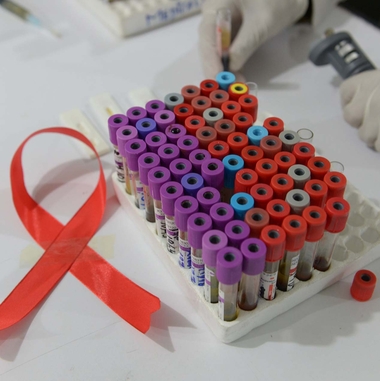HIV diagnoses in the UK fall to lowest level in nearly 20 years

New HIV diagnoses in the United Kingdom have fallen by almost a third since 2015, bringing the island nation closer to its goal of zero new HIV transmissions by 2030.
They fell from 6,271 in 2015 to 4,484 in 2018 -- a decrease of 28 percent and the lowest level since 2000, according to data released by Public Health England (PHE) on Tuesday.
The decline comes after a nationwide campaign for HIV prevention, which included more HIV testing, condom provision and the use of HIV prevention treatments like pre-exposure prophylaxis (PrEP) and antiretroviral treatment (ART).
PrEP involves the use of daily pills -- usually antiretroviral drugs -- to reduce the risk of contracting HIV through sex. The treatment is up to 90% effective, according to the US Centers for Disease Control and Prevention.
ART is just as promising -- a 2019 study of almost 1,000 gay male couples with one HIV-positive partner who took the treatment found no new cases of transmission to the HIV-negative partner during sex without a condom.
The UK, which was one of the first countries to reach the UN's targets for HIV diagnosis and treatment last year, offers free testing at various clinics and hospitals, as well as accessible self-testing kits.
Public Health Minister Jo Churchill said she was "delighted" by the new numbers. "This decline in diagnoses is a result of our unwavering commitment to prevention which has led to more people getting tested, and has allowed people with HIV to benefit from effective treatment, stopping the virus from spreading further," she said in the press release.
"However, I am not complacent and remain dedicated to ensuring we reach our target of zero new HIV transmissions by 2030."
However despite these successes, almost half of people diagnosed with HIV in the UK in 2018 were at a late stage of infection -- making them 10 times more likely to die within a year compared to patients diagnosed early.
For years, there has been no known cure for HIV, the life-long viral infection that attacks the body's immune system and can have significant health consequences. But research and case studies are beginning to show promising signs -- a patient in London is believed to be cleared of the infection, according to a study published this March.
About 37 million people are living with HIV and AIDs worldwide, according to UNAIDS, with almost a million AIDS-related deaths each year.
Some other sexually transmitted infections (STIs) aren't seeing the same advances. Last year saw a 5% increase in STI diagnoses compared to 2017, led by gonorrhea at 26% due to the rise of a extensively drug-resistant strain.
By Jessie Yeung, CNN via The-CNN-Wire, all rights reserved.
The Gayly. 9/10/2019 @5:36 p.m. CST.





